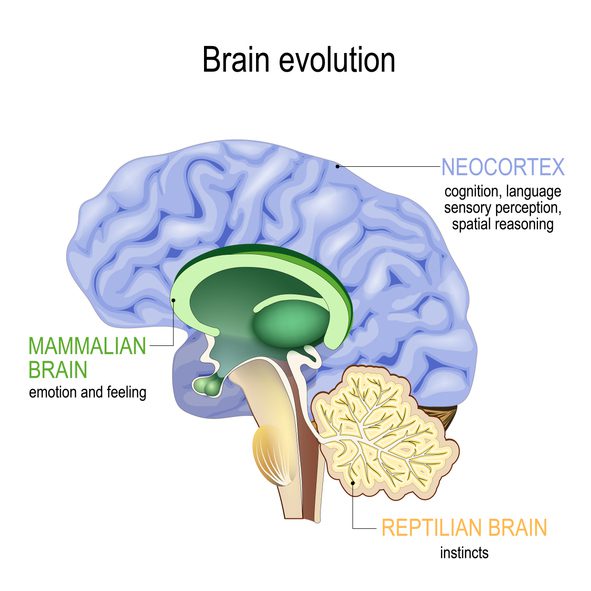By Barry Keate
Barry Keate, has lived with tinnitus over 40 years and has published 150+ research articles on numerous aspects of tinnitus. He is an expert on the condition and a well-known advocate for those with tinnitus.
 Almost everyone with tinnitus has hearing loss. We are used to thinking of hearing loss as the primary cause of tinnitus. But not everyone with hearing loss experiences tinnitus.
Almost everyone with tinnitus has hearing loss. We are used to thinking of hearing loss as the primary cause of tinnitus. But not everyone with hearing loss experiences tinnitus.
Experts estimate that only a third of people with hearing loss go on to develop tinnitus. How can this be? In this discussion we will look at areas of the brain which are responsible for tinnitus – and for emotions and depression.
The auditory system begins inside the ear, where the cochlea converts sound waves into electrical signals. These signals travel through several stages of the brain before arriving at the auditory cortex, where sound processing and hearing occur.
The cochlea contains neurons that respond to specific frequencies and generate electrical signals according to those frequencies, much like a keyboard. Likewise, the auditory cortex has neurons that respond to the specific frequencies sent by the cochlea. In people with hearing loss the cochlear keyboard is missing some keys and doesn’t transmit their frequencies. To compensate, the auditory cortex energizes keys close in frequency to the missing ones. We know signals from these frequencies as tinnitus.
In all people with hearing loss, these adjacent neurons become hyper-excited and generate tinnitus signals, whether the conscious brain hears them or not. But what determines whether these signals are heard?
The Brain’s Limbic System
 The limbic system is commonly known as the old mammalian brain. It is a series of structures where functions such as emotion, behavior, motivation, mood and memory are controlled. It is located above the older primitive or reptilian brain and beneath the cerebrum, the higher level brain tissue on the outside of the brain, which is responsible for rational thought.
The limbic system is commonly known as the old mammalian brain. It is a series of structures where functions such as emotion, behavior, motivation, mood and memory are controlled. It is located above the older primitive or reptilian brain and beneath the cerebrum, the higher level brain tissue on the outside of the brain, which is responsible for rational thought.
Recent research shows that the limbic system is involved not just in emotions, but in deciding the value of thoughts, perceptions, behaviors, and even sounds.
It is the gatekeeper that prevents tinnitus sounds from reaching the auditory cortex, where we would hear them.
We have a lot of unwanted noises in our everyday life to which we don’t want to pay attention. The limbic system determines which sounds are unimportant and blocks them before they draw our attention – except in people with tinnitus, where that gatekeeping function is lost, and the unwanted sounds are allowed to travel to the cerebral cortex.
Brain imaging studies have shown that people with tinnitus have a significant loss of tissue volume in the medial prefrontal cortex, compared with those who do not have tinnitus. Although this area does not process sound, it may modulate sensory information, such as sound, due to its close connections with key structures in the limbic system. (1)
Researchers think that this loss of volume is a clue. If it is a loss of neurons, then it makes sense that the structure wouldn’t do its job effectively, and would be much less successful at suppressing unwanted signals – and people would begin to hear ringing in their ears.
One clinical study showed moderate hyperactivity in the auditory cortex of tinnitus patients, but even greater hyperactivity – matched in frequency to patients’ tinnitus – in the limbic system.(2)
This may also explain why the incidence of depression in people with tinnitus is more than twice the national average. Tinnitus, negative emotions and depression come from malfunctions in the same areas of the brain.
If this reasoning is correct, there is much more work to be done on promising tinnitus treatments. For example, repetitive Transcranial Magnetic Stimulation (rTMS) stimulates the auditory cortex but cannot reach the depths of the limbic system.
Identifying exactly what roles are played by the limbic system and the auditory cortex is crucial in developing effective treatments for tinnitus. For example:
If the causes of tinnitus in the brain are largely auditory, treatments that target the auditory system will work best. These could include sound therapy, electrical stimulation like rTMS, and others.
If tinnitus is primarily due to the dysfunction in the limbic system, treatments targeting that system will work best. This could include drug therapies targeting chemicals in the limbic system, or implanted electrodes that reach deeper into the brain than rTMS.
Arches Tinnitus Formula
While waiting for more research toward a cure, help is available in the form of a dietary supplement that has been clinically proven to reduce tinnitus sounds for the majority of people who use it. Arches Tinnitus Formula contains Ginkgo biloba in the form of Ginkgo Max 26/7, the most highly concentrated and purest ginkgo extract available anywhere. It also contains zinc picolinate and odor-reduced garlic. This combination reduces tinnitus in three unique ways:
1 – Ginkgo and garlic increase blood circulation, particularly in the microscopic capillaries that carry blood to the eyes, ears and brain. This increases the amount of nutrients and energy available to these structures to help with healing;
2 – Ginkgo and zinc are both powerful antioxidants, working to rid the cochlea and auditory nerve of built-up toxins that are created when noise exposure damages hair cells in the cochlea. The highest amount of zinc in the human body is found in the cochlea and zinc deficiency is a known cause of tinnitus;
3 – Ginkgo Max 26/7® contains the highest amount of Bilobalide found in any ginkgo product. Bilobalide reduces the amount of glutamate in the brain. Glutamate is an excitatory neurotransmitter and is directly responsible for hyperactivity in the auditory cortex and the limbic system.
As with all natural and dietary treatments for any condition, it can take up to three months to achieve the full benefit of Arches Tinnitus Formula. You save $20 on the Starter Kit (a three-month supply) and $44.75 on the Combo Pack.
After three months, most people enjoy a significant reduction in the volume of their tinnitus.
References:
1 – National Institute on Deafness and Other Communication Disorders (NIDCD). Tinnitus: Is this what happens when the brain’s gatekeeper breaks down? March 16, 2011.
2 – Leaver AM, Renier L, Chevillet MA, et al. Dysregulation of limbic and auditory networks in tinnitus. Neuron. 2011 Jan 13;69(1):33-43.

